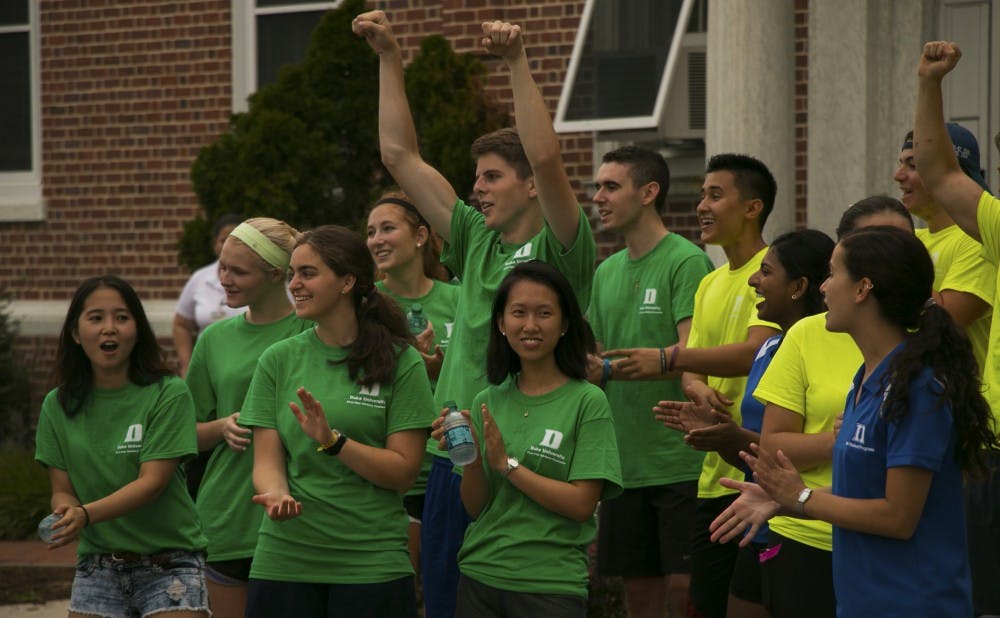More emphasis on cultural diversity will be included in the orientation for Duke freshmen, following a review of the existing programs by the Office of New Student Programs.
New cultural sensitivity programming elements, including group sessions titled "Building an Inclusive Campus Community" and "Campus Safety and Title IX," were added to the 2015 orientation with the goal of fostering a more inclusive campus climate. The sessions were added after a team in New Student Programs reviewed the past two years' programs. Currently, Duke Student Government is working with the Office of New Student Programs to further expand and improve these programs for the future.
“Our team and our student, faculty and staff partners from across campus have done a deep dive over the past two years to revamp our student welcome,” said Jordan Hale, the director of New Student Programs. “We added several new components to the 2015 orientation...and recorded welcome videos from each of our Student Affairs Campus Life offices.”
With the initiation of several new cultural diversity and identity programs during orientation week, DSG offered support by collecting student feedback and communicating it with the Office of New Student Programs.
"[DSG] let [New Student Programs] know what we saw was effective and ineffective in order to help them to improve the program going forward,” explained DSG president Keizra Mecklai, a senior.
Mecklai noted that student feedback toward the new orientation programming was mixed. Many students appreciated the effort and thought the new session was necessary, but many considered its execution to be lacking.
Freshman Alec Lintz explained that he thought the cultural sensitivity programs were well-intentioned, but that there was not enough time allotted for them to be truly effective.
“The cultural sensitivity programs are totally helpful because some people are coming to Duke with very diverse backgrounds, while others are coming from very sheltered backgrounds,” he said. “But [the first-year advisory counselor, or FAC] group chat is kind of awkward and uncomfortable. It was a very quick experience, having only 10 minutes to talk about the part of your identity that is so crucial to who you are."
In addition, the cultural sensitivity programs are unlikely to alleviate racial tensions, noted freshman Hillary Song.
"The school has to go deeper instead of implementing programs that are for show or out of bureaucratic reasons,” she said. “Small group discussion that requires mandatory attendance works, but it’s always hard to change a person’s belief in one week. Short-term solutions to this kind of problem never work out, do they?”
DSG is working on initiatives to make the orientation programs more engaging and thought-provoking for students, said junior Ilana Weisman, vice president for equity and outreach. She noted that DSG is considering implementing changes to the large sessions during the week to more critically engage students.
“During orientation week, my biggest goal is to create safe, inclusive spaces for small group conversations about identity that are facilitated by older students who are well-trained to do so,” she said.
Weisman said the orientation for the Class of 2020 may include more small group conversations about culture and identity—for example, resident assistants leading nighttime discussions about forging one’s identity on campus or FACs leading tours of campus identity centers. She added that next year's orientation may also include more programming for students of historically marginalized identities and additional information about identity centers through web-based formats similar to AlcoholEdu.
Following several racist and homophobic incidents on campus in the past year, students have called for increased diversity training. Last Spring, DSG passed a resolution supporting a request by the Black Student Alliance to implement a cultural diversity course during orientation.
Weisman said that although diversity programming and measures to enhance cultural competency will not be able to fully stamp out hateful perspectives, they can still help the campus community.
Ensuring a safe environment is the ultimate goal of new student orientation programs, Hale said.
“It is my hope that the work we do here at Duke gives students the opportunity to build the community to make them successful here at Duke and beyond,” he said. “We will continue to assess and evolve our orientation programming to establish an environment that is welcoming to all.”
Get The Chronicle straight to your inbox
Signup for our weekly newsletter. Cancel at any time.

